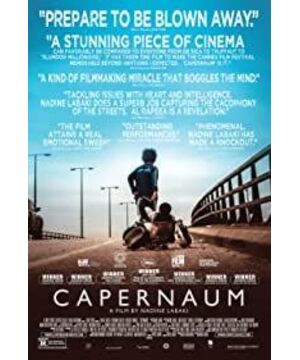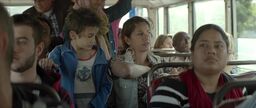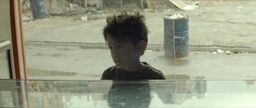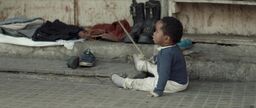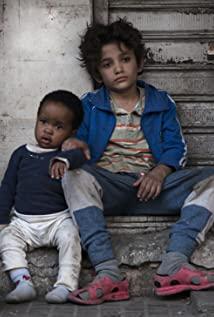And you, Capernaum, will you be lifted up to the skies? No, you will go down to the depths.
——【Lu 10:15】
Capernaum
The original name of the film is Capernaum, which is translated into a more straightforward homeland, which is better understood by most Chinese people (including me) who have no religious beliefs, but at the same time, the religious information contained in the film is lost. And I think religion is a good point of view in interpreting this film: why use a place name in the Bible to tell a story that happened in an Islamic country?
Capernaum is the name of a place, according to Matthew's Gospel, on the border of Zebulun and Naphtali, where Jesus preached and is now in ruins. The exact location of Capernaum doesn't really matter. It's the same whether it's in the north or the south. Now it's a ruin after the war. This is the meaning of Capernaum: the ruined and chaotic Lebanon has become the Capernaum of the world, the city where Zane lives, has become the Western version of the city of God, a ruin that cannot be called home.
Yes, I know a lot of people will compare "Nobody Knows" to this movie, but I'll add "City of God" to the comparison because, in my opinion, "What's Home" is the same as "God" City has more similarities.
I would describe the style of "Nobody Knows" as sad but not sad, honed inch by inch. As for "Why Home"? Probably all beings are suffering and have no head to blame.
Unlike Japan, which is a developed country, Lebanon is a poorer and more chaotic country than Brazil. As a victim of the great power game, it has been devastated to pieces. There will be no well-meaning convenience store employees here to give you leftover food, no public utilities on the street to supply you with water, or even family members who love you - on the contrary, they can really sell you. Lebanon in the movie is more like Rio de Janeiro, where gangsters run rampant and cannibalize people in "City of God". The bird's-eye view of the homes with their rubber tires pressing down on their roofs is just a variation of Brazil's slums. Moreover, this status quo is the combined effect of various factors, and even a so-called culprit cannot be found. Therefore, people can only vent their resentment from nowhere, and can only turn it into violence and act on the people around them.
Thus, Zane in the movie has a mature, even fierce, diametrically opposed look to his childish appearance. He has shown a violent side more than once, and even in the face of people stronger than himself, he has never retreated half a step - this is simply another little bully. Life tore off Zane's ignorant skin, and he had to quickly complete the transformation to adapt to this cannibalistic world. Liu Le Yumi will still use the money to buy a game console, and Zane is already skillfully helping her sister to cover up the signs of menarche. Adults behave like children, the audience will laugh, children behave like adults? I think the audience will be horrified.
This is not the uncanny valley from another angle.
courage
When Zane escapes from home, we get to see a more mature side of him. In the second act, the suffering increases instead of decreasing. The pressure Zane faces changes from life to survival. His situation becomes more and more difficult, and his struggle in the face of adversity is even more shocking. What radiates from him is the most Primitive almost instinctive desire to survive. This momentum not only infects the audience, but also highlights the theme of the film.
It takes courage to live. One of my favorite scenes is when Rashi gets caught and Zane gets the pills from the drugstore and sells them as a potion the old way. In this cutscene, Zane's tenacity is displayed in front of the audience accompanied by the background music, and even makes me feel burned: "We are all abandoned children, we are garbage dogs, some people know but no one Care, even so, we still have to live."
Responsibility requires greater courage. Take another scene as an example: the displaced Zane takes Jonas to the street, puts Jonas on the side of the road, and walks away to see if any passers-by will take Jonas. During this process, Jonas has been trying to follow Zane, and after several unsuccessful attempts, Zane decides to tie him to the side of the road.
The first layer of information revealed here is Zane's wisdom. He doesn't believe Asbro. Judging from Zane's maturity, he must have guessed that things won't be as good as Asbro said. Therefore, he prefers to pin his hopes on the kindness of pedestrians on the street.
But the fact is that people come and go, but no one wants to stop. Once again, the audience is reminded that this is Lebanon, a Lebanon that is not blessed by the gods.
Continue to wait, whether Jonas will wait for good people, we don't know, because Zane ended the wait, and he finally took Jonas away. This meant he chose to pick up the responsibility after briefly giving up on Jonas (though he ultimately failed). With Zane's mind, it is not impossible for him to live by himself, but it is beyond his ability to support a baby, but why would he want to stick to this responsibility?
Probably because he had already lost a younger sister and did not want to lose another younger brother. Last time he failed, this time he didn't want to fail again. He wanted to prove that he could live a less crippled life, and not become poorer and poorer until he was selling his sons and daughters. It was the reason he left home, and the reason why he never gave up on Jonas.
In hell, Zane wants to live like a man. It takes a lot of courage, and this movie is about courage.
Allah and God and courage.
Going back to the beginning, why did I start from the perspective of religion?
If you are careful, it is easy to notice that in the first half of the film, there have been at least three cross-shaped objects, which are the symbol of Christianity in the film. The last cross appeared before Rahi's arrest, and after that, Zane's situation went from bad to worse, and the cross was never seen again. Islam is present throughout the film, and in the prison part towards the end of the film, there is a scene of Islamic worship, which I take as a symbol of Islam. The symbols of Christianity and Islam, one appears at the beginning of the film and the other appears at the end of the film. It can be said that the two religions run through the entire film. However, has Zane's situation changed because of Allah or God?
If Allah hears, then Allah is silent.
If God is watching, then God is indifferent.
Allah is there, and Allah does not speak.
God is there, God does not save.
Only the courage of a young man can change his destiny and save himself.
This is not necessarily the original intention of the film, but it is the conclusion I draw from the film.
View more about Capernaum reviews


